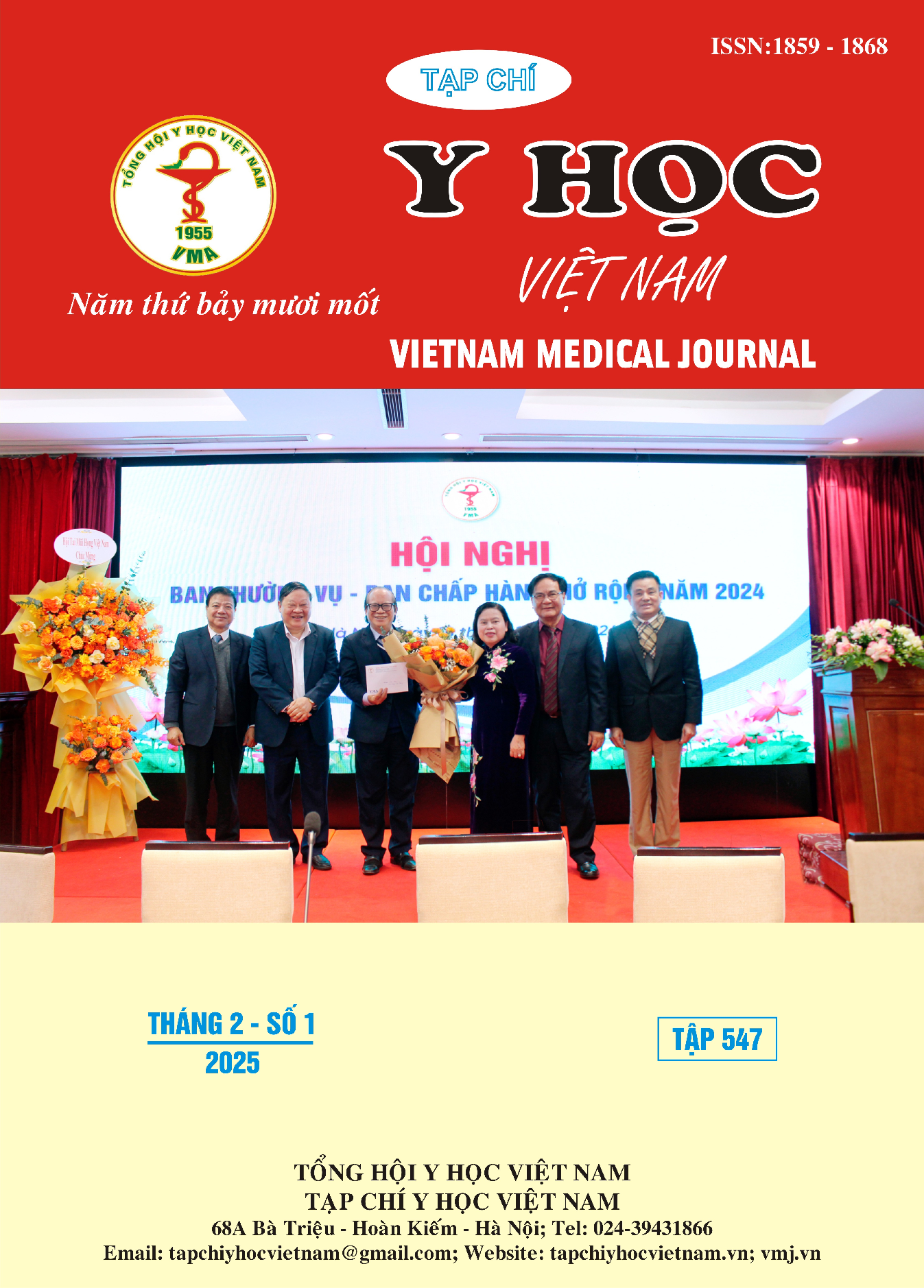EGFR GENE MUTATION STATUS IN STAGE III AND IV NON-SMALL CELL LUNG CANCER PATIENTS AT THANH HOA ONCOLOGY HOSPITAL IN 2023-2024
Main Article Content
Abstract
Lung cancer is one of the most common types of cancer in Vietnam, with non-small cell lung cancer (NSCLC) being the most prevalent histological type, accounting for up to 80%. Targeted therapies using TKI have been confirmed to be effective in patients with EGFR mutations. However, the level of effectiveness, response, or resistance to different generations of TKI depends on the type of EGFR mutation. Therefore, testing for EGFR mutations in patients plays an important role in prognosis and treatment. Objectives: 1. To determine the rate of EGFR gene mutations of stage III-IV NSCLC patients. 2. To evaluate the relationship between certain clinical characteristics and EGFR gene mutation status in the study group. Subjects and research methods: A descriptive study of 219 stage III-IV NSCLC cases was conducted with EGFR gene mutation testing performed at Thanh Hoa Cancer Hospital from November 2023 to August 2024. Results: The EGFR mutation rate in the study was 29.7%. Exon 19 (Del19) and exon 21 (L858R) were the most commonly found mutations. Females had a 5.744 times higher risk of EGFR mutation compared to males. Non-smokers had a 6.407 times higher risk of EGFR mutation compared to smokers. Conclusion: The EGFR mutation rate in this study is lower than in most domestic studies. The relationship between EGFR mutation status and clinical characteristics observed at Thanh Hoa Cancer Hospital aligns with many studies in Vietnam and globally.
Article Details
References
2. Yoneda K, Tanaka F. Molecular Diagnosis and Targeting for Lung Cancer. In: Shimada Y, Yanaga K, eds. Molecular Diagnosis and Targeting for Thoracic and Gastrointestinal Malignancy. Current Human Cell Research and Applications. Springer Singapore; 2018:1-32. doi:10.1007/978-981-10-6469-2_1
3. Hoàng Văn Thịnh, Nguyễn Bùi Ngọc Diệp, Phạm Quang Thông. Khảo sát đặc điểm giải phẫu bệnh và đột biến gen EGFR trong 726 trường hợp ung thư phổi không tế bào nhỏ. Tạp Chí Học TP Hồ Chí Minh. 2017;21 Số 4 năm 2017:448-453.
4. Yatabe Y, Kerr KM, Utomo A, et al. EGFR mutation testing practices within the Asia Pacific region: results of a multicenter diagnostic survey. J Thorac Oncol Off Publ Int Assoc Study Lung Cancer. 2015;10(3): 438-445. doi:10.1097/JTO. 0000000000000422
5. Mai Trọng Khoa, Trần Đình Hà, Nguyễn Tiến Lung, Vũ Thị Thúy Quỳnh, Nguyễn Thuận Lợi, Phạm Cẩm Phương. Đột biến gen EGFR trong ung thư phổi không tế bào nhỏ: Kết quả phân tích trên 1451 bệnh nhân tại Bệnh viện Bạch Mai. Tạp Chí Học Việt Nam. 2018;471:293-300.
6. Jiang H, Zhu M, Li Y, Li Q. Association between EGFR exon 19 or exon 21 mutations and survival rates after first-line EGFR-TKI treatment in patients with non-small cell lung cancer. Mol Clin Oncol. 2019;11(3):301-308. doi:10.3892/ mco.2019.1881
7. Harrison PT, Vyse S, Huang PH. Rare epidermal growth factor receptor (EGFR) mutations in non-small cell lung cancer. Semin Cancer Biol. 2020;61:167-179. doi:10.1016/ j.semcancer.2019.09.015
8. Denis MG, Vallée A, Théoleyre S. EGFR T790M resistance mutation in non small-cell lung carcinoma. Clin Chim Acta Int J Clin Chem. 2015;444:81-85. doi:10.1016/j.cca.2015.01.039
9. Yu XJ, Chen G, Yang J, et al. Smoking alters the evolutionary trajectory of non-small cell lung cancer. Exp Ther Med. 2019;18(5):3315-3324. doi:10.3892/etm.2019.7958
10. Zhang Y, He D, Fang W, et al. The Difference of Clinical Characteristics Between Patients With Exon 19 Deletion and Those With L858R Mutation in Nonsmall Cell Lung Cancer. Medicine (Baltimore). 2015;94(44):e1949. doi:10.1097/MD. 0000000000001949


